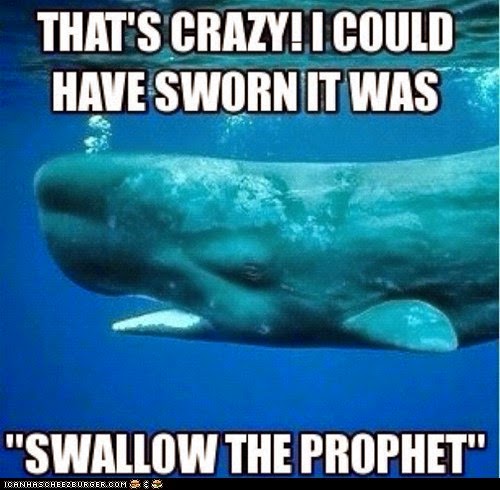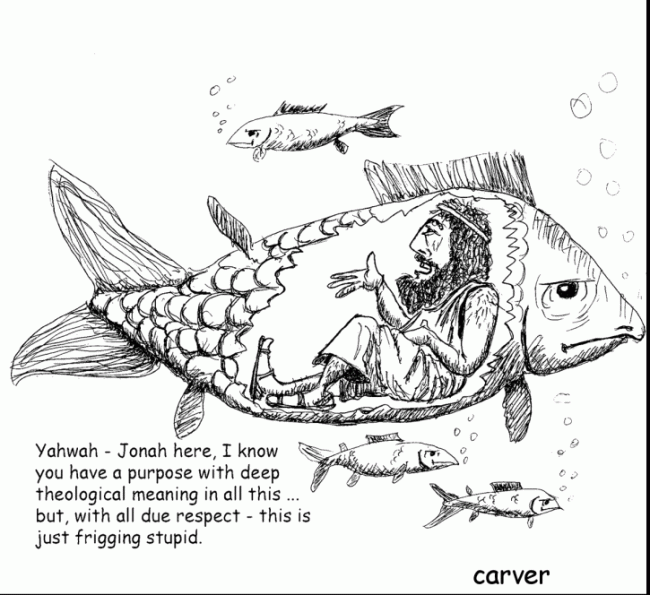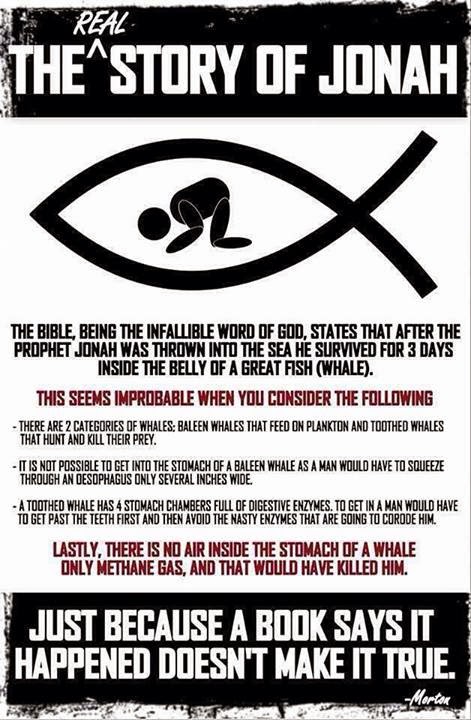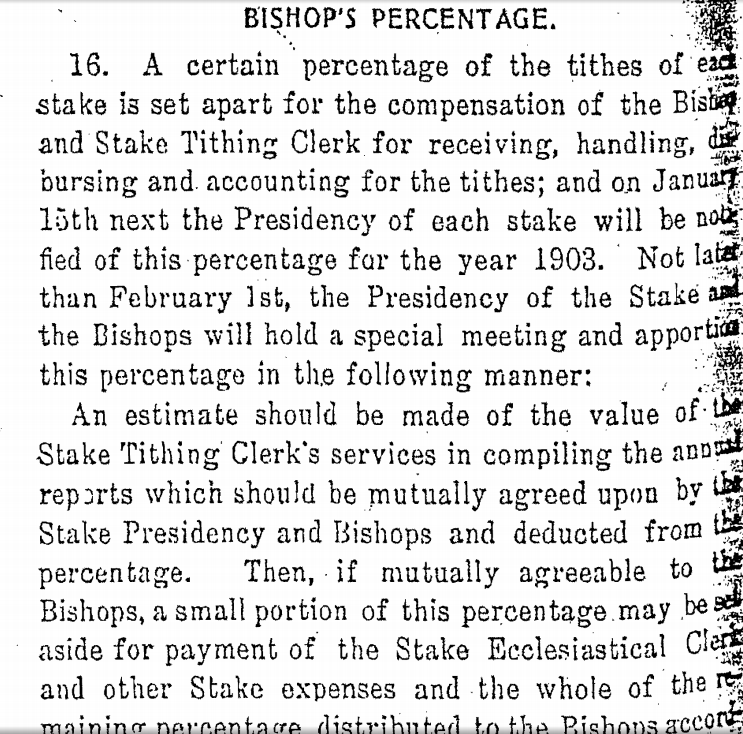Sharing the Gospel with the World
Jonah 1–4; Micah 2; 4–7
LDS manual: here
Reading
After reading Kings and Chronicles, this reading marks a strange transition. Before, if there was a group of people that didn’t believe in Jehovah / Jesus — well, you’d just kill them and their children, on down to the fourth generation. But now it seems that there’s been a shift. Now, you’re supposed to use convincement and persuadance. Religions do mellow out sometimes.
This story concerns Jonah, who was told to go to Ninevah and preach.
Jonah 1:1 Now the word of the LORD came unto Jonah the son of Amittai, saying,
1:2 Arise, go to Nineveh, that great city, and cry against it; for their wickedness is come up before me.
Myself, I would have told Jehovah / Jesus to go do his own dirty work.
And that raises an interesting point: Why would a god need humans to go around and tell other people about him? For that matter, why wouldn’t he be able to impart knowledge about himself to everyone directly? If he can appear to one person and communicate his will, why can’t he do the same thing to a big group of people all at the same time? It would be a lot less ambiguous, more clear, and above all, verifiable. Why only one person? Why the secrecy? Why does god go to all the trouble of making himself look like the delusional beliefs of one person?
Oh… unless gods don’t actually exist, and prophets are either crazy people (which we’ll see later in the OT) or liars (as in our day).
Anyway, Jonah legs it, and gets onto a ship.
1:3 But Jonah rose up to flee unto Tarshish from the presence of the LORD, and went down to Joppa; and he found a ship going to Tarshish: so he paid the fare thereof, and went down into it, to go with them unto Tarshish from the presence of the LORD.
God, not to be so easily brushed off, tries to kill everyone on the ship.
1:4 But the LORD sent out a great wind into the sea, and there was a mighty tempest in the sea, so that the ship was like to be broken.
The sailors ask Jonah what his deal is.
1:8 Then said they unto him, Tell us, we pray thee, for whose cause this evil is upon us; What is thine occupation? and whence comest thou? what is thy country? and of what people art thou?
1:9 And he said unto them, I am an Hebrew; and I fear the LORD, the God of heaven, which hath made the sea and the dry land.
1:10 Then were the men exceedingly afraid, and said unto him. Why hast thou done this? For the men knew that he fled from the presence of the LORD, because he had told them.
Notice their reaction: “You’ve got Yahweh pissed at us? We’re fucked!” They know he’s the most ruthless and cruel god ever invented. Maybe they read Judges.
So they toss him overboard, and Jonah is fish food.
1:15 So they look up Jonah, and cast him forth into the sea: and the sea ceased from her raging.
1:16 Then the men feared the LORD exceedingly, and offered a sacrifice unto the LORD, and made vows.
1:17 Now the LORD had prepared a great fish to swallow up Jonah. And Jonah was in the belly of the fish three days and three nights.
Jonah prays for deliverance from his ichthyic prison.
2:1 Then Jonah prayed unto the LORD his God out of the fish’s belly,
And the prayer must have gone something like this:
Well, whatever was said, God tickled the fish, and — baaarf! — out onto the beach came Jonah and tons of ambergris in a big sludgy pile.
2:10 And the LORD spake unto the fish, and it vomited out Jonah upon the dry land.
Jonah’s arrival apparently made quite an impression on the Ninevites, who immediately converted.
3:5 So the people of Nineveh believed God, and proclaimed a fast, and put on sackcloth, from the greatest of them even to the least of them.
3:6 For word came unto the king of Nineveh, and he arose from his throne, and he laid his robe from him, and covered him with sackcloth, and sat in ashes.
3:7 And he caused it to be proclaimed and published through Nineveh by the decree of the king and his nobles, saying, Let neither man nor beast, herd nor flock, taste any thing: let them not feed, nor drink water:
The king’s like, “We’d better not give any food or water to anyone, even our animals, because even they’ve been very sinful.” Apparently, that’s how evil this place was. Even the sheep are evil. Like this one:
So the Lord repents:
3:10 And God saw their works, that they turned from their evil way; and God repented of the evil, that he had said that he would do unto them; and he did it not.
I don’t have a problem with God repenting. That’s probably just a semantic thing. What’s more worrying is that God didn’t seem to know that the people would repent. Or perhaps that he would need humans to feel a certain way about him or do certain things for him. I don’t know what being a god is like, but I hope I’d be above all that.
Anyway, Jonah’s ticked at God’s backtracking. He can’t believe God wouldn’t destroy everyone like Jonah said God would. Has Jehovah / Jesus not been paying attention to the last few lessons? So God messes with his head for a while, in an attempt to make him feel better.
4:6 And the LORD God prepared a gourd, and made it to come up over Jonah, that it might be a shadow over his head, to deliver him from his grief. So Jonah was exceeding glad of the gourd.
4:7 But God prepared a worm when the morning rose the next day, and it smote the gourd that it withered.
The lesson also has some material from Micah, including some isolated out-of-context scriptures about temples and mountains, which Mormons really like.
Micah 4:1 But in the last days it shall come to pass, that the mountain of the house of the LORD shall be established in the top of the mountains, and it shall be exalted above the hills; and people shall flow unto it.
How could that not be about Salt Lake City, amirite?
4:2 And many nations shall come, and say, Come, and let us go up to the mountain of the LORD, and to the house of the God of Jacob; and he will teach us of his ways, and we will walk in his paths: for the law shall go forth of Zion, and the word of the LORD from Jerusalem.
That sounds kind of nice. Why, it sounds a bit like religious pluralism.
4:5 For all people will walk every one in the name of his god, and we will walk in the name of the LORD our God for ever and ever.
But wait — that didn’t last long. Later on in that very same chapter, we see that Jehovah / Jesus intends for the Saints to beat many people in pieces, and take their substance.
4:13 Arise and thresh, O daughter of Zion: for I will make thine horn iron, and I will make thy hoofs brass: and thou shalt beat in pieces many people: and I will consecrate their gain unto the LORD, and their substance unto the Lord of the whole earth.
Not surprisingly, the real lesson manual stresses the threshing — you know, like harvesting souls! — and downplays the money-making angle and all the beating.
What can we learn from Micah 4:11–13 about the latter-day destiny of Israel? (In the ancient world, oxen were often used to thresh grain. They would walk over the grain, separating the chaff from the kernel. The chaff was blown away and the kernel saved. The nations that oppose Zion will be gathered as sheaves and then be threshed by Israel.) How might this separation of the chaff from the kernel be compared to latter-day Israel’s responsibility to do missionary work throughout the world? (See D&C 29:7; 33:5–7.)
Whatever, real manual. I still think it’s insulting to speak of unbelievers like they’re worthless chaff. But that’s the mindset you need, if you going to tell people they’re living wrong, and you’re doing it right. I can’t believe I did that for two years.
Main points for this lesson
Can someone survive in a giant fish?
Jonah is obviously just a silly story, at least to sensible people with a grip on reality. The story hardly seems worth debunking — except that people do believe it, even modern Christians. Answers in Genesis, Christian Answers, and (rather more ambivalently) Catholic Answers all maintain that this was a real — or possibly real — event, though they do give a nod to the story’s implausibility.
Their reasoning?
- God can do anything, I mean, c’mon!
- One guy survived a whale-swallowing once.
This latter point refers to James Bartley, who purportedly (and dubiously) survived an internship in a sperm whale in 1891. Cecil Adams of the Straight Dope has addressed this myth, and calls it a yarn.
I’m not a marine biologist, but apparently this graphic is, so have a look.
So Jonah’s story is probably just a big fish story. Oh, sure, believers will invoke miracles, but there’s no limit to what some people will swallow.
Yep, he would have.
Sharing the gospel
The real lesson manual stresses the importance of going on a mission, by which I mean “lays on the blame”.
Through his prophets, the Lord has repeatedly commanded every worthy, able young man to serve a full-time mission. He has also encouraged senior couples to serve as full-time missionaries if they are able. (See the additional teaching ideas.) What are some reasons why some able young men and senior couples choose not to serve missions? (Lack of commitment and faith, unworthiness, unwillingness to leave the comforts of home and family, fear of what might be expected of them.) What can we learn from the story of Jonah that can help us be more valiant in obeying the Lord and sharing the gospel?
Wow, check that out. They’re really piling on the guilt and recrimination.
Ask: Why are church members unwilling to consider that there might be some good reasons not to go on a mission?
Answer: Missionising is a source of converts and income for the church. But perhaps more importantly, getting someone on a mission is a way of getting the missionary to say they believe something over and over again. This is important for self-indoctrination, which I think has become the real purpose of a mission. From a Redditor:
As a former non-mormon missionary myself, I know how this stuff works. Eventually, I noticed that their missionaries are young guys, 18-22, very formative years, away from home, away from their support structure, continually sent out to get ridiculed or told to bugger off, and continually being rejected. Then I realized it’s not actually about converting anyone (Though that’s a nice bonus if it happens), it’s actually about sticking these kids in a position where they’re continually attacked, and their only support comes from the church. It’s a very intensive form of indoctrination.
And not just that — it’s also to put them in a situation where they have to become amateur apologists; make up plausible-sounding explanations for all the contradictions and absurdities that they’ll be faced with in the mission field. It’s this “skill” that will have a lot of smart people doing mental gymnastics through years of church activity. Sometimes the smarter they are, the better they get at apologetics, and the longer they stay.
While we’re on Reddit threads, this one says something I’ve been thinking for a while. Every once in a while, a discussion will come up about whether the Mormon Church is a cult. I don’t like that much. Maybe it’s a leftover reaction — I always used to bridle at this kind of talk in my churchy days. Or maybe it’s because the term cult isn’t well-defined, so it’s an unhelpful question. What’s culty, and what’s not? Isn’t a cult just an unpopular religion? Christianity itself used to be a Jewish cult. And so on.
I don’t know if the LDS Church is a cult or not, but I will say one thing: An LDS mission is really really far on the culty scale, whichever one you’re using. Take for instance the BITE model. I don’t know if it’s a well-accepted model in psychology, so let’s just take this as interesting.
The BITE model looks at four aspects of control, all of which happen on a mission:
• Behaviour Control
Your behaviour is regulated, with a set schedule and all your time accounted for. What you wear, who you’re with, what you do — all these things are handed to you. On a foreign mission, your passport is taken from you, first thing as a matter of course.
• Information Control
Your sources of input are restricted, including news, TV, music, and books. Communication with family and friends is limited to letters and rare phone calls.
• Thought Control
You report deviant thoughts, or have them reported by your companion. Your name and identity are replaced — you’re “Elder” or “Sister” now, and your first name never gets used.
• Emotional Control
You’re encouraged to control your thoughts using hymns. Doubt is wrong. The organisation can’t fail, but you can fail the organisation. Happiness only comes by diligence and right thinking.
Ask: How many items on the BITE list did you experience on your mission, if you served one?
If you did not, what reasons did people offer for your not doing so? How did members feel that this reflected on your character?
For Mormon culture, the mission is what anthropologists might refer to as a ‘manhood ritual‘ (which may be why they don’t seem as interested in women serving missions). Like other initiation rituals, it gives access to opportunities within the community, as well as access to high-status females. But in my view, the LDS mission is designed to turn missionaries into lifelong devoted members — and maybe convert a few people on the side.
Additional teaching ideas
Micah’s criticism of prophets who prophecy for money
One of the problems in Micah’s day was prophets who get paid.
Micah 3:11 The heads thereof judge for reward, and the priests thereof teach for hire, and the prophets thereof divine for money: yet will they lean upon the LORD, and say, Is not the LORD among us? none evil can come upon us.
Truly this scripture was written for our day.
On that note, did you know that bishops used to get a cut of the tithing, at least in 1902?
That’s just one of the revelations that’s come to light in the latest data dump of all the Church Handbooks. Yes, they’ve been leaked, and you can read them here. This is a big deal because they’re the rules by which the church is conducted, and regular members aren’t allowed to read them.
Casting lots
The ancient Hebrews had big problems with divination, but in Jonah, it seems that casting lots is a pretty reliable way of getting answers.
Jonah 1:7 And they said every one to his fellow, Come, and let us cast lots, that we may know for whose cause this evil is upon us. So they cast lots, and the lot fell upon Jonah.
And that’s not the first time casting lots worked. Remember when Johnathan ate some honey when he wasn’t supposed to? Saul cast lots to find that he’d done the deed.
1 Samuel 14:41 Therefore Saul said unto the LORD God of Israel, Give a perfect lot. And Saul and Jonathan were taken: but the people escaped.
14:42 And Saul said, Cast lots between me and Jonathan my son. And Jonathan was taken.
14:43 Then Saul said to Jonathan, Tell me what thou hast done. And Jonathan told him, and said, I did but taste a little honey with the end of the rod that was in mine hand, and, lo, I must die.
14:44 And Saul answered, God do so and more also: for thou shalt surely die, Jonathan.
It sure worked then. And in fact, the Urim and Thummim (contra Joseph Smith) probably functioned like dice. One wonders why, then, the Brethren disapprove of gambling.
But hey, why use lots when you can use Answer Me Jesus™? Go ahead, try asking him yourself!








Recent Comments